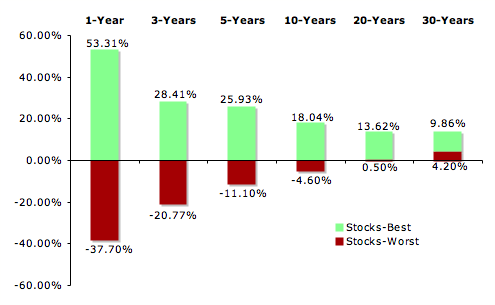Are Bonds Safer Than Stocks
Post on: 19 Июнь, 2015 No Comment

Taking a Look at the Old Myth that Bonds are Safer than Stocks
Investing in bonds isn’t always necessarily safer than investing in stocks. Bonds can fluctuate in value, bonds can lose purchasing power in periods of high inflation, and bonds can get wiped out in bankruptcy court if a company fails. Peter Zeray, Photodisc, Getty Images
Many new, and even experienced, investors often make the mistake of repeating the old saying that investing in bonds is always safer than investing in stocks . This isn’t necessarily true. Benjamin Graham said that a better question investors should ask themselves is, On what terms, and at what price [am I buying this investment?].
An example may help you understand the concept. Imagine you have a choice between two investments for your portfolio. The first is a bond that pays 8.5% interest annually. If the company goes bankrupt, this particular bond is third in line after other creditors for anything that remains once the assets have been liquidated, the real estate sold, etc. (This is called liquidation preference. As a general rule, bond holders come first, then preferred stock holders, then common stock holders. But each company is different. Of course, typically, you want to avoid investing in bankruptcy situations; they are complex and most new investors lack the knowledge, experience, and resources to take advantage of these special circumstances.)
The second investment is common stock of a debt-free company that trades at a p/e ratio of 10, which is an earnings yield of 10%. Approximately 50% of the profits are mailed to stockholders each year as dividends. resulting in a dividend yield of 5%. Management is good, sales are stable and growing slightly faster than inflation, and if something goes wrong, the stockholders are the first in line in liquidation preference since there are no bond holders or preferred stock holders ahead of them.
In this scenario, I would consider investing in the stock to be safer than investing in the bond. Surprised? There are several reasons for my belief.

Reasons I Might Consider the Stock Safer Than the Bond
There are several reasons I would consider the stock in our vignette safer than the bond.
- The stock has nothing in front of it. It is first in line in terms of liquidation preference. As Benjamin Graham said in the 1934 edition of the famous book, Security Analysis (the so-called Bible of investing), a common stock with nothing ahead of it must, by definition, be just as safe as a bond with nothing ahead of it because if something goes wrong, they are the first people in line to receive anything left after the employees, landlords, vendors, and other prior creditors have been paid.
- The bonds pay interest of 8.5% annually but under current tax rules, this works out to a net yield of 5.53% because your interest income is taxed as ordinary income. That means someone in the top income tax bracket loses 35% of their bond interest to taxes, plus any state taxes that would be owed. The stock, in contrast, has a 5% dividend yield but dividends are taxed at a maximum rate of 15%. This means the dividend yield net of taxes is 4.25%. Thus, the difference between the two yields is not 3.5% as it would appear on the surface, but only 1.28%
- It is possible, if things go well, for a stock to raise its dividend rate to help the investor keep pace with inflation as companies increase the price of their products and services. With a bond, you get the bond coupon rate and that is it. If inflation went back to the years of Presidents Carter and Reagan, you would be losing purchasing power each year if you were locked into the bond (I wrote about this in Profiting from Inflation. At least the stock has a chance of overcoming the challenge of high inflation, provided it isn’t an asset intensive business that requires a lot of money, such as a steel mill or a heavy construction firm.)














